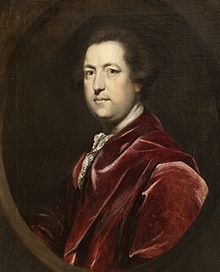Townshend Acts
![]()
This article or subsequent section is not sufficiently supported by evidence (e.g., anecdotal evidence). Information without sufficient evidence may be removed in the near future. Please help Wikipedia by researching the information and adding good supporting evidence.
The Townshend Acts, named after Charles Townshend, the British Chancellor of the Exchequer who introduced them, were laws passed by the British Parliament on June 29, 1767, imposing duties on the importation of various goods from Great Britain into its American colonies. The goods listed in the laws were articles of daily use, for example, tea, glass, lead, paint, varnish, paper, and leather.
This decision was related to the so-called Stamp Act, which had been passed two years earlier and was intended to oblige the colonies to pay a stamp duty on all documents. As a result of fierce opposition from the colonists in the Thirteen Colonies, the Stamp Act had to be withdrawn in 1766. The Townshend Acts were intended to restore the authority of the mother country over the colonies. To this end, three special courts, the Admiralty Courts, were created to enforce the duties.
Nevertheless, resentment arose among the colonists against this decision, which they perceived as a renewed provocation. The so-called Sons of Liberty united under the slogan "no taxation without representation," coined by James Otis Jr. Opponents of the tariffs called for boycotts of British goods, and the tariffs were increasingly undermined by smuggling trade. The center of the boycott movement was the city of Boston, where Samuel Adams was at the forefront of anti-British agitation. In the face of these fierce reactions, voices against the Townshend Acts were also raised in mainland Britain, especially in business circles, where American boycott reactions were felt most acutely.
These protests forced the British government to withdraw the Townshend Acts. However, in order to make it clear that in principle the right of taxation was being retained, tea imported into the Thirteen Colonies remained excluded from the withdrawal of taxation. The bankrupt British East India Company had a surplus of unsold tea in the early 1770s, and the Tea Act of 1773 allowed the East India Company to ship its tea directly to the colonies, which was thus unaffected by tariffs in England. The Americans would have seen this as an attempt to curb the smuggling of Dutch tea and a corruption to recognize the tea tax and the right of taxation of the English Parliament. This was the trigger for the Boston Tea Party and ultimately the American War of Independence.
Revenue from Townshend in the first year was circa £295, with implementation costs estimated at £170,000.

Charles Townshend
Search within the encyclopedia